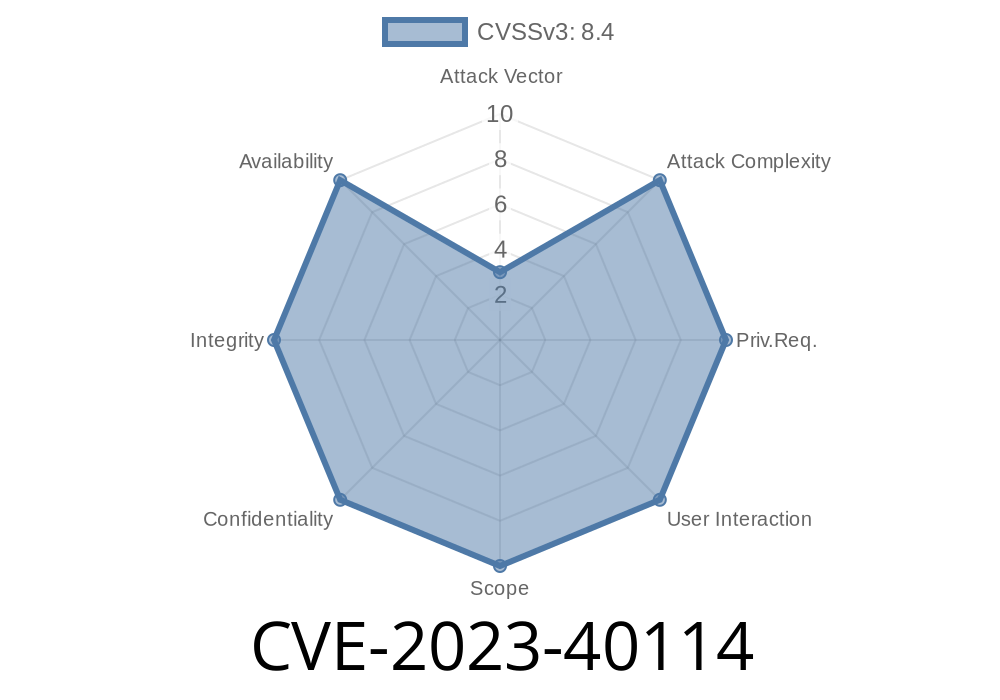In August 2023, a new security bug surfaced in Android’s Media Transfer Protocol (MTP) handling code: CVE-2023-40114. This vulnerability lets attackers exploit a use-after-free (UAF) flaw for local privilege escalation, affecting millions of devices. In this post, I’ll break down how this bug works, share easy-to-read code snippets, link original resources, and explain a step-by-step exploit scenario—even for non-experts.
What Is CVE-2023-40114?
CVE-2023-40114 quietly hides in multiple functions of the MtpFfsHandle.cpp file. The core issue: after freeing certain memory, the code tries to use it again. When this happens, an attacker may write data outside of allocated boundaries (out-of-bounds write), potentially corrupting memory, gaining elevated privileges, or crashing the system.
The Android Security Bulletin’s official NVD entry sums it up
> *“In multiple functions of MtpFfsHandle.cpp, there is a possible out of bounds write due to a use after free. This could lead to local escalation of privilege with no additional execution privileges needed. User interaction is needed for exploitation.”*
> (NVD Entry: CVE-2023-40114)
Where Does the Bug Happen?
The vulnerable code sits in Android’s framework-responsible for media transfer between devices (like copying files via USB). The MTP FfsHandle interface deals with USB communication.
Free: An object or buffer is deleted from memory.
2. Use After Free: The program continues using that memory pointer, not realizing it’s now “dangling”—pointing to unpredictable data.
Here’s a simplified version of what goes wrong in MtpFfsHandle.cpp
// Simulated logic from MtpFfsHandle.cpp
void processMtpRequest(Request *req) {
if (shouldFreeRequest(req)) {
free(req); // Memory is released here
}
// ... some other logic ...
handleRequest(req); // UAF: req pointer now points to freed memory!
}
If req is freed, but later functions still use it, an attacker can trigger unpredictable behavior: writing into areas of memory they control, even code pointers or data structures.
For the actual Android code, see AOSP’s MtpFfsHandle.cpp.
How Could an Attacker Exploit This?
1. Local Access Needed: This is a local privilege escalation. An attacker (or malicious app with limited permissions) must run code on the target Android device.
2. User Interaction Required: Triggering the vulnerability might involve typical user actions (like plugging in a USB, transferring files, or approving MTP requests).
Attack Steps:
- The attacker carefully crafts a sequence of events that cause the MtpFfsHandle code to free a crucial memory buffer.
- Before the system allocates something new in that memory region, the attacker arranges for a controlled object or data to occupy it.
- When the code uses the previously freed pointer, it now manipulates attacker-controlled memory. This could let the attacker overwrite sensitive data or function pointers, leading to code execution as a more privileged system service.
Exploit Example Logic
Note: For responsibility, I’ll describe the exploit logic, not publish a weaponized day.
// pseudo-code for exploit
function exploit() {
// 1. Trigger a file transfer over MTP that makes MtpFfsHandle free a buffer
trigger_free_buffer();
// 2. Rapidly allocate your own data to reclaim the freed spot in memory
allocate_controlled_object();
// 3. The system, unaware, uses the freed pointer. You control what it reads/writes!
trigger_use_after_free();
}
The most likely targets are devices running unpatched Android versions where these MtpFfsHandle.cpp bugs remain.
Mitigation
Android has issued patches starting August 2023. Device makers are distributing fixes in security updates. Here’s how you can stay safe:
Update your Android device regularly.
- Only connect your device to trusted computers and approve file transfer requests from trustworthy sources.
Avoid installing unfamiliar apps that request USB control or media permissions.
Developers:
References
- NVD – CVE-2023-40114 Entry
- Android Security Bulletin – August 2023
- MtpFfsHandle.cpp in Android Source
- Google's AOSP Commit for Patch
Conclusion
CVE-2023-40114 is a classic but dangerous example of a use-after-free bug offering attackers a shot at local privilege escalation on Android devices. While this requires local access and some user interaction, it’s a reminder to always keep your devices updated and be mindful of strange file transfer operations.
If you’re a developer, double-check your memory management in any native code—UAF bugs like this often lurk in complex code paths. And if you’re a user, hit that “Update” button!
*Exclusively written for you — stay safe, and follow best practices!*
Further Reading:
- Google’s Android Source Security Notes
- How Use-After-Free Vulnerabilities Work (Project Zero)
Timeline
Published on: 02/15/2024 23:15:08 UTC
Last modified on: 08/15/2024 18:35:04 UTC
